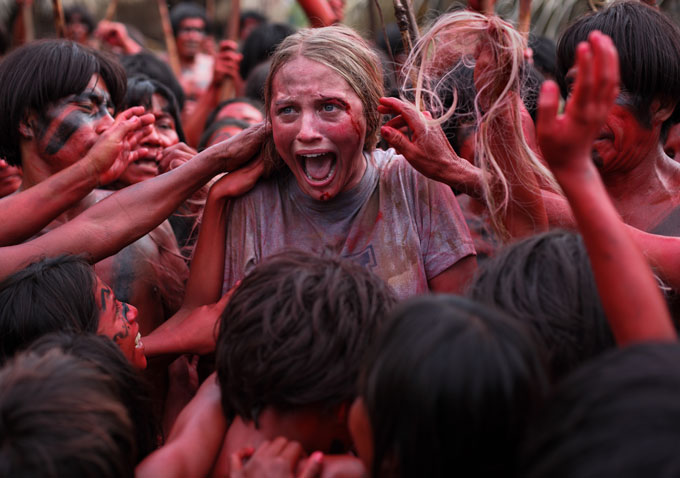
When Eli Roth first appeared on the scene a decade ago, he looked like he might just be the savior the horror genre was looking for. A wave of hype preceded his debut “Cabin Fever,” thanks to a raucous reception at TIFF Midnight Madness, a seal of approval from David Lynch and from Roth himself, who name dropped “Evil Dead” and “Texas Chainsaw Massacre” as influences and promised a return to the glory days of ’70s/’80s horror. In the post-“Scream,” pre-“Saw” early aughts, that seemed like a hell of a good proposition for most horror fans. When the film was released the following year, it couldn’t help but come as a bit of a letdown (especially when held next to the aforementioned classics) but by that point, Roth had already gotten his audience in the door. Perhaps sensing he had made his audience a promise he didn’t fully deliver on, he pushed things further with 2005’s “Hostel,” a truly scary and original horror premise though it was not without its issues, at the very least it seemed as if Roth was reaching for the brass ring of making a truly great horror film and inching a little closer towards it.
He followed that film with one hugely disappointing sequel/rehash, 2007’s “Hostel: Part II,” and in intervening years has flirted with a host of projects which never came to pass (the Stephen King adaptation “Cellular,” a feature-length expansion of his “Grindhouse” short, a sci-fi film called “Endangered Species,” etc.), stepped in front of the camera for friends (“Inglourious Basterds,” “Aftershock“) and helped bring the Netflix series “Hemlock Grove” to life. Those waiting to see Roth step back behind the camera finally got their wish when his 4th feature, the low-budget cannibal horror tale “The Green Inferno,” showed up on the TIFF roster. During his introduction at the film’s TIFF World Premiere, Roth quoted Drake lyrics, led an impromptu FaceTime birthday singalong and warned the rowdy Midnight Madness crowd who had already been sold on Roth’s “Cannibal Holocaust” comparisons, “whatever movie you have in your head, pause that movie for 90 minutes.” Yes, Eli Roth is back.
 The basic setup will be familiar to anyone who saw “Hostel” as the film centers on a group of college students traveling abroad who become the hostages of malevolent others who wish to bring them great harm. In this case, the students are an activist group called ACT who set out to disrupt the destruction of a rainforest in Peru. Recruited to this group of nouveau hippies by their handsome leader Alejandro (Ariel Levy) is NYU freshman Justine (Lorenza Izzo), whose father works at the United Nations. Before she takes off for Peru, Justine and her dorm mate Kaycee (a strung-out looking Sky Ferreira) attend an Anthropology class which describes a tribe that engages in female genital mutilation as a rite of passage so you can probably guess how that might come into play later on. The NYC-set first act of the film is by far the weakest. The acting, score and cheap digital cinematography all make it look like bad British TV and the script does not fare much better. (Sample dialogue: “I think you’re 100% wrong.” “Well, you’re 100% whore.” “I’m 50/50.” Woof.)
The basic setup will be familiar to anyone who saw “Hostel” as the film centers on a group of college students traveling abroad who become the hostages of malevolent others who wish to bring them great harm. In this case, the students are an activist group called ACT who set out to disrupt the destruction of a rainforest in Peru. Recruited to this group of nouveau hippies by their handsome leader Alejandro (Ariel Levy) is NYU freshman Justine (Lorenza Izzo), whose father works at the United Nations. Before she takes off for Peru, Justine and her dorm mate Kaycee (a strung-out looking Sky Ferreira) attend an Anthropology class which describes a tribe that engages in female genital mutilation as a rite of passage so you can probably guess how that might come into play later on. The NYC-set first act of the film is by far the weakest. The acting, score and cheap digital cinematography all make it look like bad British TV and the script does not fare much better. (Sample dialogue: “I think you’re 100% wrong.” “Well, you’re 100% whore.” “I’m 50/50.” Woof.)
It seems, ironically, much more amateurish than any of Roth’s previous features, to the point where you start to wonder why he chose this as his comeback vehicle. The production value comes in once they arrive in Peru and are surrounded by gorgeous jungle landscapes in every direction. The group set out to disrupt the demolition by tying themselves to trees and bulldozers and live-streaming themselves on their phones (and thankfully there is a conveniently placed gigantic satellite dish nearby which gives them a pretty decent internet connection in the middle of the jungle). Without spoiling anything, shortly after this stunt something goes wrong and the crew find themselves stranded on an island full of very dangerous inhabitants. The natives are primitive, with their bodies painted red, their village surrounded by severed heads on pikes. Culturally insensitive? Probably. Effective? Definitely. The group are captured and almost immediately one of them is taken for a ritual dismemberment which is as disgusting as anything seen in horror films for the last several years: tongue and eyes gouged are out and eaten, limbs severed entirely. While this is the sort of thing you might see fairly routinely in a zombie film (back before the genre would serve as a PG-13 Brad Pitt vehicle), it’s much more unsettling here.


